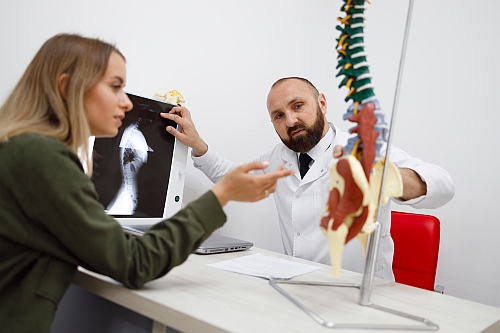Whiplash is a common neck injury from car accidents, especially rear-end collisions. It can be subtle at first, with symptoms not showing up until days later. If left untreated, whiplash can lead to chronic pain and long-term problems. Recognizing the signs early is key to avoiding damage. If you’ve been in an accident recently, be sure to monitor your symptoms and seek medical attention if needed.
In this blog, we will go over the signs and symptoms of whiplash, why they don’t show up right after a car accident, and why you need to see an experienced Atlanta spine care specialist to get an accurate diagnosis and proper treatment for a full recovery.
What is Whiplash?
Whiplash occurs when the neck is subjected to a sudden forceful motion, usually in a car accident. The cervical spine, which comprises the neck region, is particularly vulnerable during such forceful motions. Understanding how it happens will help you identify the injury and get the right treatment.
Rear End Collisions
One of the most common causes of whiplash is rear-end collisions. When a car hits you from behind, the body goes forward and the head goes back and then snaps forward. This violent motion can result in a neck sprain, where the ligaments in the neck are torn. This violent motion stretches and tears the muscles, ligaments, and tendons in the neck and that’s what we call whiplash.
Head-On Collisions
While rear-end collisions are the most common cause, head-on collisions can also cause whiplash. In this case, the head is pushed forward and then pulled back and that’s similar to the strain on the soft tissues of the neck. The force can cause severe neck pain, which may require immediate medical attention. The force can vary depending on the speed and severity of the impact and can cause more complex injuries.
Non-Auto Accident Causes
While most people associate whiplash with car accidents, whiplash can occur in other high-impact situations. Contact sports like football or boxing can cause neck injuries from sudden head movements. Falls, physical assaults, or even activities like cycling and horseback riding can cause whiplash if the head and neck are jerked. In some cases, a neck brace may be used to provide support, although long-term use is generally discouraged.
Everyday Situations
Less dramatic everyday situations can also cause whiplash in some cases. Sudden stops in vehicles, amusement park rides, or even a forceful sneeze can strain the neck muscles especially if the neck is already vulnerable from a previous injury or poor posture. While less severe, these situations can still cause lingering pain and stiffness.
Signs and Symptoms of Whiplash
Whiplash symptoms can vary widely depending on the severity of the injury but here are some common signs that you may have whiplash after an accident. These symptoms are part of what is known as whiplash-associated disorders (WAD), which can persist for years if not properly treated.
Neck Pain and Stiffness
The most common sign of whiplash is neck pain. This can show up right after the injury or hours or days later. Along with pain, stiffness in the neck can limit your ability to move your head in different directions. The muscles and ligaments in the neck are strained so basic movements like turning your head or looking over your shoulder are hard and painful. In some cases, the neck pain can escalate to severe pain, significantly impacting daily activities.
Headaches
Headaches are another common symptom of whiplash, usually starting at the base of the skull and radiating to the forehead. These headaches are from the tension and stress on the neck muscles and can range from mild to severe. For many, this is one of the first signs they realize they’ve been whiplashed.
Dizziness and Disorientation
In some cases, whiplash can affect the body’s sense of balance and cause dizziness and disorientation. This happens when the trauma hits the nerves or muscles around the neck and you feel lightheaded or confused. Dizziness can be sporadic or persistent throughout the recovery process.
Tingling or Numbness in the Arms
Whiplash can also compress the nerves in the neck and cause symptoms like tingling or numbness in the arms or hands. This happens when the inflammation from the injury affects the spinal cord, leading to nerve compression. This happens when the inflammation from the injury affects the nerve pathways and you feel pins and needles or loss of feeling. It can also be accompanied by weakness in the arms.
Fatigue and Sleep Disturbances
Fatigue is a lesser-known but common symptom of whiplash. The physical trauma of the injury plus the pain and discomfort can cause exhaustion. In some cases, it can also disrupt sleep cause more tiredness, and slow down the recovery process. This fatigue can prolong the healing period and affect the overall well-being of the injured person.
Why You May Not Feel Symptoms Right Away
In many cases, the symptoms of whiplash don’t show up right after the accident. Several factors can delay the onset of pain and discomfort so it’s important to be aware in the hours and days after the injury.
Adrenaline Masking Pain
After an accident your body releases adrenaline. This hormone helps you respond quickly in emergencies by increasing your heart rate and suppressing pain. While this is good in the moment it can also mask the injury delay the pain and make it hard to feel the immediate effects of whiplash.
Inflammation Takes Time to Develop
Whiplash often involves damage to muscles, ligaments, and other soft tissues in the neck. The inflammation from this damage doesn’t always show up right away. It can take hours or even days for the swelling and stiffness to fully develop and for symptoms like pain or restricted movement to show up.
Gradual Onset of Symptoms
In some cases, whiplash symptoms can start mild and get worse over time. Mild neck discomfort can turn into pain or stiffness. This gradual onset can make you dismiss early symptoms and if left untreated can lead to more severe symptoms later. Ignoring early symptoms can lead to severe whiplash, which requires more extensive treatment and a longer recovery time.
Ignoring Initial Discomfort
People often underestimate or ignore mild discomfort after an accident thinking it will go away on its own. However, without proper medical attention, these mild symptoms can turn into chronic pain or long-term complications. You should get evaluated even if you feel fine right after the accident.
When to Get Help
Knowing when to get help after a whiplash injury is important for your recovery. Delaying treatment can lead to long-term health complications and slow down your recovery process.
Get Medical Help Right Away
You should get medical care as soon as possible after a car accident even if you don’t feel the symptoms of whiplash right away. A healthcare professional can assess the injury early and prevent it from getting worse. Early medical intervention is key to managing pain and proper recovery. Plus, timely medical care gives you important documentation of your injury which may be needed if further complications arise.
Watch for Delayed Symptoms
Whiplash symptoms don’t always show up right away. Even if you feel fine right after the accident you should monitor yourself for signs of injury over the next few days. Symptoms like neck pain, headaches, dizziness, or restricted movement can develop later. If any of these symptoms show up you should see a healthcare professional as soon as possible. Early diagnosis and treatment of whiplash injuries can prevent chronic pain and long-term health issues.
Follow-Up
Whiplash recovery often requires ongoing care including physical therapy or chiropractic. Follow-up appointments will ensure your treatment plan is working and make adjustments as needed. Catch those lingering symptoms early before they become chronic.
Seek Care From an Atlanta Spine Care Specialist ASAP!
If you’ve recently been in a car accident and are experiencing any signs of whiplash, don’t wait for the symptoms to worsen. Early diagnosis and treatment are essential to your recovery. Our team at Georgia Spine & Orthopaedics is here to provide expert care and guide you through your healing process.
Schedule an appointment with us today at 678-929-4494!






